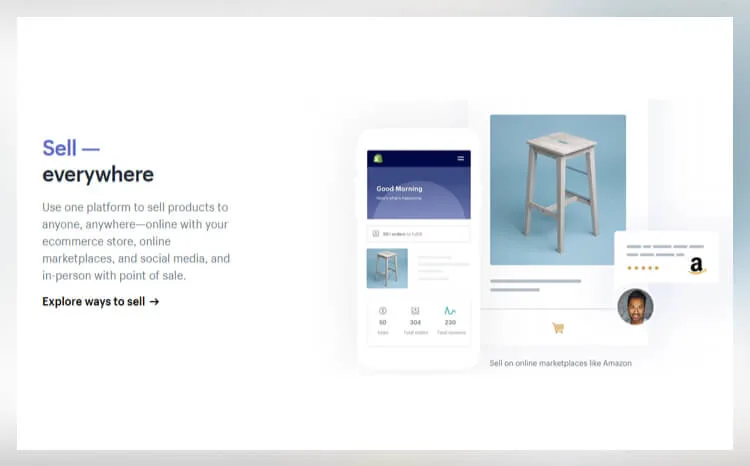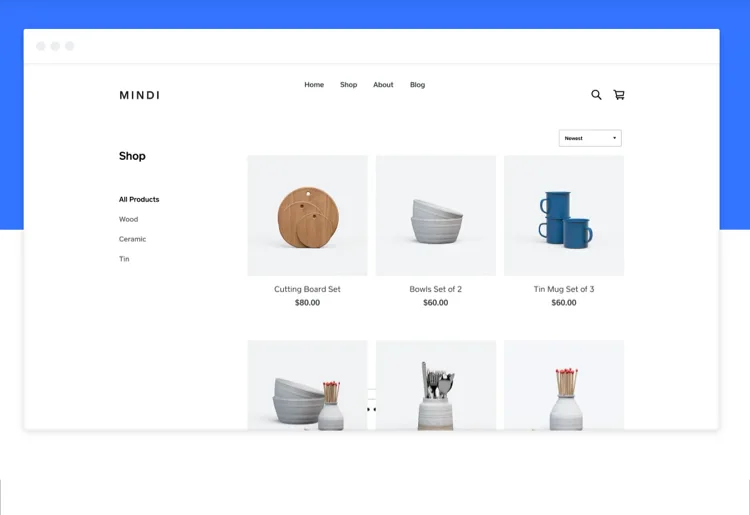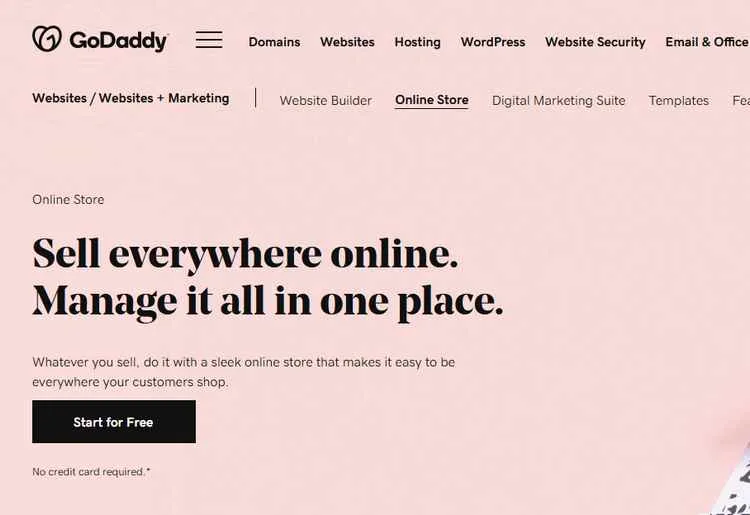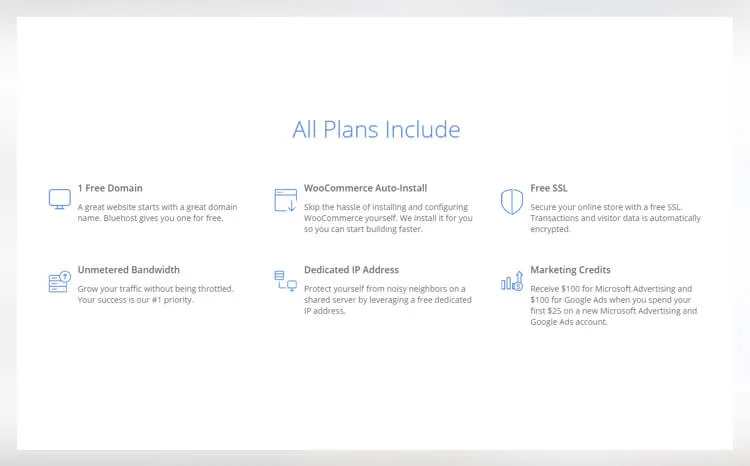Top 5 Best E-commerce Solution in 2023

John Doe
Designer

Our Top 3 Picks

Pipedrive –All-purpose CRM to support businesses
- Industry-reputation for excellent features suite
- Extremely simple to use
- 100+ payment gateways
- 3 months free trial for $1/month
- Industry-reputation for excellent features suite
- Extremely simple to use
Rated 4.8 out of 5

- Exceptional options included in the free plan
- Easy-to-create ecommerce sites
- Competitive pricing
- From $12 or free plan
- Limited templates
- Not available for overseas orders
Rated 4.6 out of 5

- Easy-to-use for novices
- Mobile-friendly and attractive templates
- Integrates with top marketplaces
- No custom code additions
- Can't export content
Rated 4.3 out of 5
There is no doubt that the future of commerce is shifting to online commerce, especially as more businesses deal with the impact of COVID-19. Our phones are always available 2 /7 and the ease of browsing, shopping, comparing, shipping and even returning makes online shopping the preferred choice for almost everyone Nowadays.
So the question for any growing business owner becomes: How do I log in? This is the easy part. You can find thousands of e-commerce websites with a simple Google search. The hard part is choosing the right one for your business. A website builder should be easy to use, offer the right mix of features, and everything should fit within your budget. Are you a little scared? do not do it; Here are the top 10 eCommerce website builders on the market for businesses planning to expand in 2023.
Top 5 Best E-commerce Solution in 2023
Here is a list of the 5 best E-commerce Solution in 2023, based on factors such as functionalities, price, effictiveness, and user-friendliness:
1

Shopify

- Great for - SMBs, startups seeking advanced features
- Price - From $29
- Free trial - Yes, 3 months for $1/month on select plans
Shopify is probably the most popular e-commerce platform today. It’s easy to use, has more built-in features than you know, and even supports multi-channel selling and social media integration. Shopify offers some great features like inventory management and abandoned cart recovery. You can also use more than 100 payment gateways for hassle-free transactions.
The only downside to this all-in-one e-commerce website builder is the transaction fee charged per transaction. You can skip this payment with Shopify Payments, but expect to be charged if you focus on your processor. Shopify offers 2 /7 support, 12,000 third-party app installs, and 50+ well-designed themes with a simple editor to give your website a custom look.
Pros
- Industry-reputation for excellent features suite
- Extremely simple to use
- 100+ payment gateways
Cons
- Have to reformat content when switching templates
- Applies a transaction fee unless using Shopify Payments
2

Square

- Great for - Domestic US businesses
- Price - From $12 or free plan
- Free trial - Yes
Square’s e-commerce service offers business owners in the US and Canada an easy way to do business online. It offers an attractive payment model with a unique commission structure and many tools, making it a competitive option for those looking for a balance between ease and professionalism.
It’s easier to create an online store with Square than with some competitors. Templates are limited, but the website builder offers a selection of dynamic themes and services for restaurants, services, businesses, and nonprofits. Users can access Square’s full suite of tools and services, including point-of-sale hardware and simplified inventory and planning tools. For businesses operating in the US and Canada, Square offers attractive templates with a unique pricing structure and an easy-to-use, versatile and professional website builder.
Pros
- Exceptional options included in the free plan
- Easy-to-create ecommerce sites
- Competitive pricing
Cons
- Limited templates
- Not available for overseas orders
3

GoDaddy

- Great for - Easy, all-in-one online stores
- Price - From $25
- Free trial - Yes
GoDaddy Website and Marketing is an easy-to-use website builder that you can start for free and turn into a fully functional online store that seamlessly integrates with major global marketplaces like Amazon and eBay.
You can choose the template that best suits your industry, design a custom store without technical knowledge, and integrate all the tools you need for a successful e-commerce operation, such as easy product download, inventory synchronization between platforms, social networks, content. marketing and SEO. optimization and more.
Pros
- Easy-to-use for novices
- Mobile-friendly and attractive templates
- Integrates with top marketplaces
Cons
- No custom code additions
- Can't export content
4

BigCommerce

- Great for - Businesses seeking scalability
- Price - From $29.95
- Free trial - 15 days
BigCommerce is one of the largest and most well-known eCommerce builders on the market today. This is due to the wide range of features, sales tools and integration offered by their services. The user-friendly system allows you to quickly and efficiently create an online store, sell products and accept payments. However, BigCommerce also offers tools that can really help improve your business. Things like analytics, SEO tools, and next-level shipping allow online stores to move products faster.
Although not all templates are responsive, most work well on mobile devices. With features like abandoned cart recovery, SSL security certificates, and the ability to sell through multiple channels (like Amazon, Instagram, Facebook, etc.), it’s worth trying out a few templates on BigCommerce to reap the benefits.
Pros
- Scales easily with your business growth
- Multichannel selling made easy
- Huge assortment of tools and features
Cons
- Not all designs are responsive
- Tough learning curve at the beginning
5

WooCommerce by Bluehost

- Great for - WordPress businesses
- Price - From $19.99
- Free trial - 30 days, 90-day money-back guarantee
When you sign up with Bluehost powered by WooCommerce, you really get the power of 3 big brands powering your online store. WooCommerce is an open source online store builder designed specifically for WordPress websites that is known to be easy to use while still packing a punch. BlueHost is an all-in-one hosting service that gives you an SSL certificate, a free domain name, and one-click WordPress installation with every plan.
So you know you’re getting solid, reliable service from this dynamic duo. When it comes to designing the website itself, WooCommerce is a great choice. It only takes a few minutes to choose and design your website from one of the templates. You can then set up your online store using the many plugins available. Add your products, create discount codes, set VAT rules and pay based on your shopping cart. Not only does Portfolio Teams grow with your business, but if you’re looking for easy migrations, easy setup, and lots of features, it’s simply a more efficient, simple, and easy-to-use solution. A system you may have dealt with before.
Pros
- Get all your hosting requirements included
- 1-click WordPress setup
- Unlimited bandwidth and storage
Cons
- Not as scalable as other options
- Very WordPress-focused